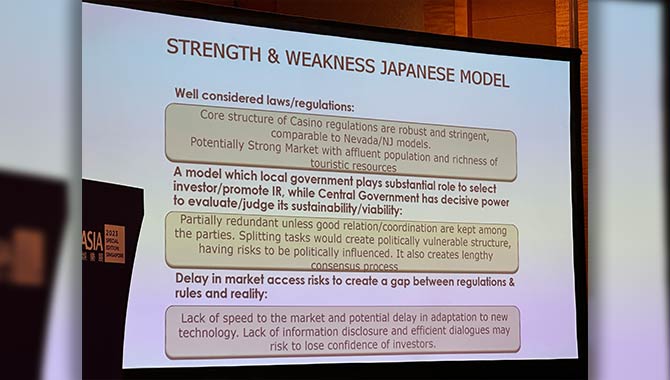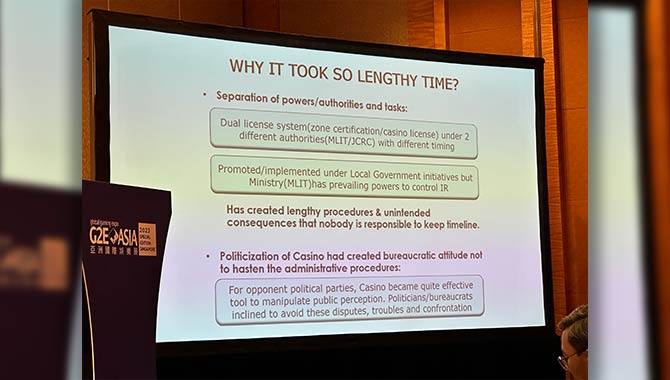G2E Asia hosted a panel of guests to discuss legalising gambling in Thailand and Japan, for which Gambling Insider was in attendance.
Hosting the panel was Fredric Gushin, Managing Director at Spectrum Gaming, while guests on the panel were: Toru Mihara, Chairman of the National Council on Gaming Legislation, James Kaplan, CEO at Destination Capital Thailand, and Udorn Olsson, Advisor to Thailand’s House Committee on casino gaming.
Japan is moving forward in the gambling world and has authorised the licensing of up to three integrated resorts, while Thailand is now at the beginning of the process. In Japan the first casino (Osaka Integrated Resort) is scheduled for 2030.
Speaking on Japan, Gushin said: “While there are universal principles and best practices, each country is different and they have their own separate legislative and executive processes. Each has their own culture and their relationships with both legal and illegal things, so it's never as easy as it seems.
“The Singapore model takes extensive governmental will to implement the variety of publicly announced policy goals and clearly with any government that has the will to do that; that is clearly a strong model to follow for countries like Japan and Thailand. Essentially, governments are asking casino developers and investors to invest billions of dollars in Integrated Resort (IR) projects.”

Gushin continued: “Governments are responsible for creating rules and regulations that will allow a reasonable return on investment; to provide a tax environment which will justify such a large investment, provide a reasonable return on investment and finally establish a regulatory oversight structure that will protect such investments. This includes compliance, licensing and AML standards that are enforced and viable – it doesn't seem that hard, but it's not that easy either.”
Mihara expanded further on the gaming industry thus far in Japan: “I've been asked by many foreign friends, members of the industries, why are the Japanese so slow?… You have to understand there are two issues, one is the institution and one is the crucial element of Chinese design in a Japanese system.
“There has been a discussion that the Japanese market will build on some of the South East Asian market, but that's not true. The market price is growing as is the market as a whole; so in respect of Japan's strength, I think the Asian market will grow together.”
When discussing the potential legality of gaming in Thailand, Olsson thinks it will be a positive addition to the country’s current financial position.
He said: “We have the Covid-19 situation in Thailand and we have a very, very big problem with the economy in Thailand. The most important income from Thailand – the revenue – is coming from the tourist industry. A total of 14% of GDP is coming from the tourist industry.”
I believe Thailand will legalise gaming in the near future somewhere between tomorrow and the next 36 months. The question is what is it going to look like? - James Kaplan
Olsson expands: “The report talking about social impact is also very important. People worry about the social impact in Thailand. The report stated that the Government said we must consider issues regarding the social impact on legalised gaming. We will consider the political, economic and environmental impacts.”
Similar to Japan, Thailand appears to have the same concerns regarding the social impact on its people, rather than the economic impact on the country.
“We don't want to let people have a social problem,” stated Olsson.
Kaplan went on to expand on Thailand’s potential future relationship with gambling and how he thinks the legalisation of gambling over there is inevitable:
“I've got a bit of history in Thailand with gaming going back about 20 years ago under the tax administration and Thailand has struggled with legalising gaming for decades. It's probably one of the most divisive political issues in the country.
“I believe Thailand will legalise gaming in the near future somewhere between tomorrow and the next 36 months. The question is what is it going to look like? Unfortunately I don't believe it will be completely aligned with Singapore in the regulatory framework, which will allow the big US operators to come to Thailand. I would be very surprised if it has that level of regulatory compliance. Thailand has always done things differently and always been successful.”

The above image is with regards to the legalisation of gambling in Japan.
Post-Covid-19 pandemic Thailand ended up in a lot of debt, circa $300bn, so legalising gaming could be a step forward in recouping some of that debt and getting the country economically back on track.
Kaplan stated: “The Thai Government borrowed around $46bn during the pandemic to support the country and people's lives. So today the public debt in Thailand is around $300bn. To put it in perspective, it's almost 60% of the country's GDP. It's the biggest it's been in over 20 years.”
He also questioned whether the quality of tourist that Thailand has been attracting will benefit its gaming industry (if it were to have one), saying: “The gaming that's done correctly will energise tourism in Thailand. One of the problems and challenges with Thai tourism is the quality of tourists has been falling a little bit. By that, the spending habits of the tourists have been falling a bit. Thailand needs to attract a higher quality tourist.”
Kaplan concluded: “Gaming revenue can help pay down that big corporate debt, we can create jobs. Is that worth it with the social challenges? That's kind of the debate that was talked about a little bit before. Is that worth it? I think it probably is.
“So the fact whether or not Thailand legalises or doesn't legalise it. People gamble anyway, so if you can regulate it, licence it, tax it and introduce benefits for people so that they can avoid the addiction because it's an addiction. So you have to treat it like a drug addiction or alcohol addiction or a smoking addiction. It's an addiction to work with.
“People work with a casino operator, work with families, work with governments to control that; that's going to be a big part of it for the city itself. So I think for those reasons they'll move forward with gaming in Thailand.”


































